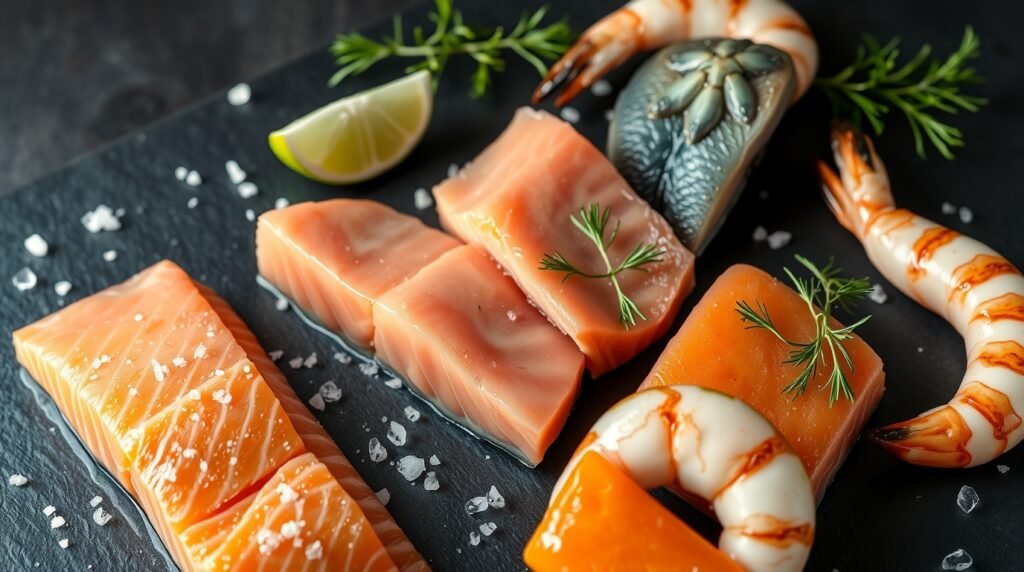
The Best Protein Rich Diet for Muscle Building Now: Essential Foods to Include
The other key part of gaining muscle when you’re following a workout plan is diet, including eating the right foods and consuming enough of them. The type and quantity of protein you eat can have a major impact on your fitness results. Here are a few key foods you might want to add to your daily diet.
Meat and Poultry
Lean meats are an excellent protein. Here are some excellent options:
- Chicken Breast: Being low in fat, high in protein it is considered good for muscle building. One serving contains about 31 grams of protein.
- Turkey: Turkey, like chicken, is another excellent option. It has around 29 grams of protein per quarter and is packed with vital vitamins such as B6, B12 and iron.
- Lean Beef: As not only does it contain a good helping dose of protein, but beef also delivers high on iron content —”and is important for muscle recovery. Choose cuts like sirloin or tenderloin for lower fats, which have approximately 22 grams of protein per 3-ounce serving.
Fish and Seafood
You can easily opt for fish and seafood in a protein–filled diet. They contain good quality protein and omega-3 fatty acids that are beneficial for health:
- Salmon: This fatty fish has about 22 grams of protein per serving and omega-3s that helps recovery of your muscles.
- Tuna: Tuna is loaded with protein —about 20 grams in a 3-ounce serving. It’s flexible — you can consume it canned or fresh.
- Shrimp: Shrimp is also low in calories and contains roughly 24 grams of protein per 3-ounce serving. They take no time to cook and can be added to pretty much everything.
Dairy Products
Dairy can serve as a good source of protein and calcium. Consider including these options:
- Greek Yogurt: Rich and creamy, Greek yogurt has roughly 20 grams of protein per serving. From face masks to probiotics for gut health.
- Cottage Cheese: A single cup of cottage cheese offers around 25g protein, making it an ideal snack choice post-workout.
- Milk: Whole and skim milk also contain about 8 grams of protein per cup, so it’s a quick way to throw an extra few grams of the muscle-building nutrient into your shakes or smoothies.
Plant-Based Proteins
If you’re thinking about plants, you still have plenty of options in protein-rich foods. They not only can help create muscle but are rich in fiber and other important nutrients:
- Lentils: A go-to for many vegetarians, lentils provide around 18 grams of protein per cooked cup. They have so many uses, in soups or salads, as a side.
- Chickpeas: Also called garbanzo beans, chickpeas offer some 15 grams of protein in a cooked cup and can be used to make hummus or tossed into salads.
- Quinoa: A superfood that is one of the only plant-based sources to offer all nine essential amino acids, having about 8 grams protein per cooked cup.
Nuts and Seeds
These little bites pack protein and healthy fats, which is awesome!
- Almonds: High in protein, almonds have 6 grams of protein per ounce. You can eat them raw, by roasting, or added to your food for extra crunchy delight.
- Chia Seeds: Despite their size, these tiny seeds are protein powerhouses, at roughly 2 grams per ounce, and are also rich in omega-3 fatty acids and fiber.
- Pumpkin Seeds: Also known as pepitas, pumpkin seeds have 9 grams of protein per ounce and are the perfect thing to sprinkle on salads or in homemade granola.
Adding these protein-rich foods to your diet can help you get to those muscle-gaining goals. Remember, balance is key. Be sure to combine these proteins with healthy fats and carbohydrates for best effects. If you eat a mix of these foods, not only will you get the protein needed to repair and grow muscle, but you’ll also be getting in certain essential nutrients that are key for overall fitness as well.
Macronutrient Information: How Protein Helps You Build Muscles
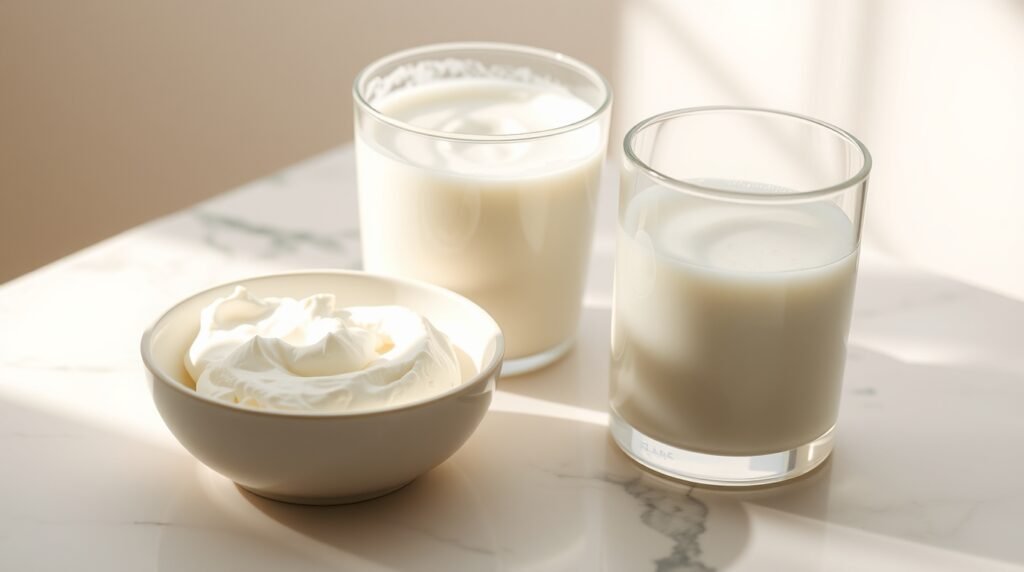
Knowledge on macronutrients is key for muscle building. Statements Macronutrients include proteins, carbohydrates and fats. 58 Of these, protein is an important component in the growth and repair of muscles. In this post you’ll see exactly how protein works in your body and why it should be a major part of any healthy diet.
What is Protein?
Protein, a macronutrient composed of amino acids — building blocks of the body. When you eat protein, your body breaks it down into those amino acids, which play a role in repairing and building up muscle tissue. This is particularly true for those who are doing some form of strength workout or high intensity exercising.
Why is Protein Important when Building Muscle?
In order to gain muscle and increase lean body mass efficiently, your body requires protein for a few reasons:
- Muscle repair: When you exercise hard, small tears occur in the muscle fibers. “Protein supports the repair of these fibers, which promotes muscle growth,” Dr. Hertzler added.
- New Muscle Tissue Synthesis: The body utilizes amino acids from protein to construct new muscle, injury or post-exercise.
- Builds muscle mass: Adequate protein intake increases muscle size, particularly when exercising or lifting weights.
Preventing Muscle Loss adequate protein status helps prevent muscle breakdown, cyclically during periods of weight loss or aging.
How Much Protein Do You Need?
Your protein needs may differ based on your body weight, activity level and workout goals. For those who are wanting to add muscle, there is a general recommendation that can be followed:
- For general muscle maintenance: 0.8 grams of protein per kilogram of body weight.
- To gain muscle: 1.6 to 2.2 grams of protein per kilogram of body weight.
This can equate to approximately 1.2-1 gram of protein per lb of body weight for anyone really trying to gain muscle. It’s important to distribute this protein intake across the day to help with muscle repair and growth.
Best Sources of Protein
When deciding on the most beneficial protein sources, think of foods with top quality supplies of protein and essential amino acids. Here are some top choices:
- Lean meat: Chicken breast, turkey, lean beef and pork cuts are great sources.
- Fish: Salmon, tuna, and tilapia are high in protein and healthy fats.
- Dairy: Good sources of protein and they also contain calcium. Greek yogurt, cottage cheese plus milk provide both.
- Legumes: Beans, lentils and chickpeas are excellent plant-based protein choices.
- Nuts and Seeds: Almonds, chia seeds and pumpkin seeds offer protein and good fats.
Timing Your Protein Intake
Timing your protein intake around your workouts is one way to optimize muscle growth. Eating protein before and after workouts can help you recover faster and gain more muscle. Aim for a protein rich snack or meal approximately 30 minutes to 2 hours after your workout. This will aid your body in repairing muscles more effectively.
Protein Supplements
Whole food protein sources are best, but protein supplements are an easy way to hit your targets. The most popular ones include whey protein, casein and plant-based powders. They can be extra beneficial if you’re struggling to get enough protein from food alone, or if you want a quick option on the run.
Common Misconceptions about Protein
Here are a few myths about protein consumption that can confuse the issue:
- You Need More Protein to Build Muscle: Just eating a lot of protein will not put your muscles into overdrive; it needs to be accompanied by the right kind of exercise and diet.
- Only Bodybuilders Need Protein: Though body builders do require more protein to build muscle, generally anyone who is physically active should be consuming more protein.
Protein is key in the development of muscles. If you know how much protein to eat, select your sources wisely and time meal consumption appropriately, you will effectively be able to support all the work in the gym and compliment muscle building. Keep in mind to eat protein along with a balanced diet and regular training for optimal results.
When should you eat for the maximum muscle gains?
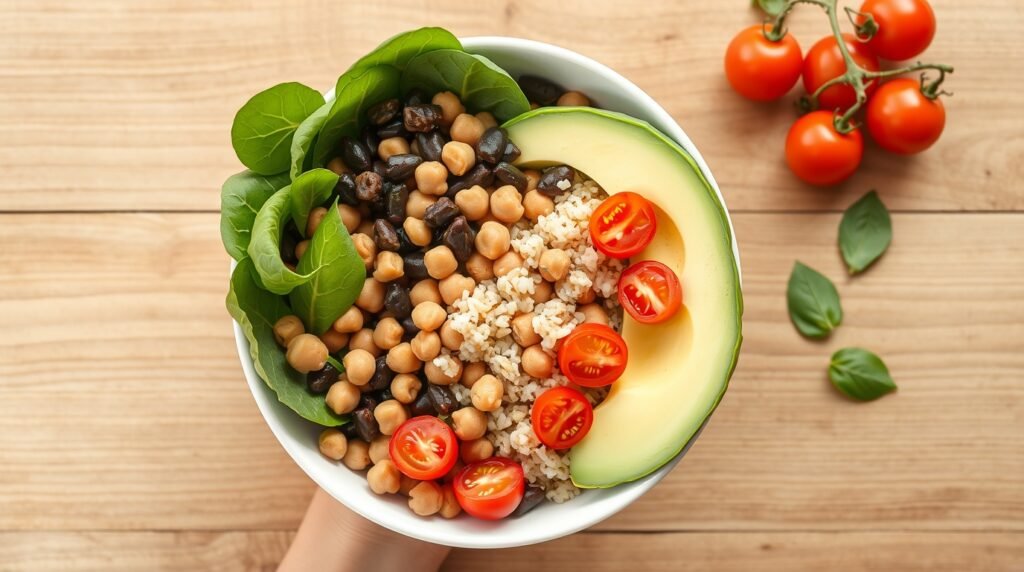
For packing on muscle, protein is paramount – but so is when you consume it. Eating protein at the right time can cost less and help your body repair, recover and grow muscles more efficiently. So let’s dig into what the rules are for when and how best to time that protein.
The optimal window for protein ingestion is largely based around when you are training. Eating protein before and post work-outs means better repair of your muscles. It’s commonly recommended that you try to take in a serving of protein within 30 minutes to two hours following your workout.
Pre-Workout Protein Intake
Consuming protein before your workout can help provide you with the energy you need to achieve optimal performance. It aids in priming your muscles for the strain they will undergo with the workout. Here’s what you need to know:
- Timing: Aim to eat a high-protein meal or snack 30 minutes to one hour before you exercise.
- Opt for the right source: Get your protein from sources that are easy on your stomach, like Greek yogurt, protein shakes or a banana with almond butter. These choices are energy rich without being loading.
- Add some carbs: When you pair protein with good carbohydrates, it can help improve performance. We’re talking oatmeal with protein powder or a smoothie with fruits and yogurt.
Post-Workout Protein Intake
Protein becomes critical after your workout, because the body is ready to recover. Here’s what you need to know:
- Opportune time: Try to eat a meal or snack with protein 30 minutes to two hours post workout. This has typically been labelled the “anabolic window,” when your body is primed for nutrients.
- Protein sources: This could include protein shakes, chicken, fish or legumes are good alternatives. A good goal is 20 to 30 grams of protein, which evidence indicates can help maximize muscle recovery and growth.
- Hydrate: You still need to drink, even if you’re just sitting on the couch watching TV. Muscle recovery is optimized with adequate hydration.
Daily Protein Consumption
While when you consume protein is important, it’s also crucial to consider the total amount of protein that you’re eating in a given day. Here is some advice to help make sure you’re getting enough protein every day:
- Spread it out: Get 20-30 grams of protein at every meal and snack, all day long. This keeps amino acids flowing into the muscles for repair.
- Don’t forget protein Two to three portions of protein a day (from eggs, lean meat, tofu, beans or dairy), either for lunch and dinner or breakfast and dinner.
- Pre-sleep protein: There is some evidence to suggest a pre-sleep protein snack may also help in muscle recovery. Some alternatives to this would be cottage cheese or a casein protein shake.
Consider Individual Needs
Everyone’s body is different and individual factors such as how much you weigh, intensity of your workouts, and the goals of your fitness routine play a role in determining just how much protein you need. Here’s how to figure out what works for you:
- Calculate your protein needs: Most individuals need between 1.2 and 2.2 grams of protein per kilogram of body weight, depending on activity level and goals.
- Fine-tune: Pay attention to how protein timing influences your progress and the way your body responds. Please adjust your intake and meal timing according to the actual effect.
Incorporating efficient protein timing practices into your regimen will allow you to maximize muscle growth and recovery. Focus your pre and post workout nutrition, but also ensure that protein intake is consistent throughout the day. As a result, you will likely see better results in the gym and greater muscle growth over time.
Which Provides a Better Source of Protein for Muscle Growth: Plants or Animals?
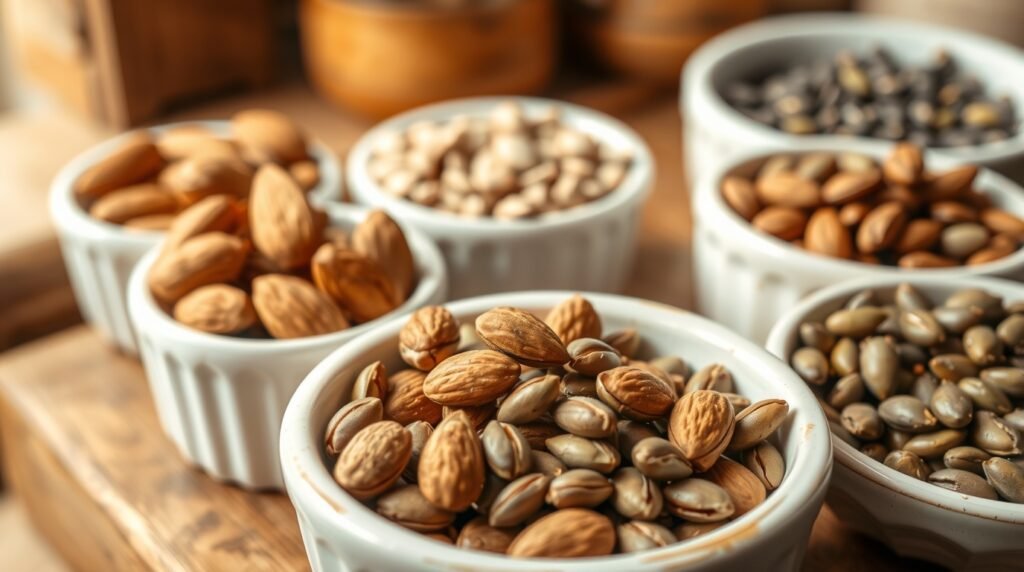
When it comes to adding muscle, the protein is an essential macronutrient. The kind of protein you decide on can make a big difference with your results. It’s a common question as to whether consuming plant-based or animal-based proteins is better for muscle development. Each has its advantages and disadvantages. The productive time you can save by knowing these will help guide your decision that will support your fitness goal.
Animal-Based Proteins
Animal proteins come from meat, seafood, dairy, and eggs. They’re frequently referred to as complete proteins because they have all nine essential amino acids your body can’t make on its own. This trait makes them infinitely useful for means of muscle repair and growth.
- High Biological Value: In general animal proteins have a higher biological value, which means that your body can make better use of them.
- Creatine-Rich: The meat of animals is also rich in creatine, a substance that contributes to strength and muscle gain.
- Fast Digesting: Animal proteins digest a lot faster so they contain all your essential amino acids out of the post-workout.
That said, we need to focus on the health implications of eating animal products. Some may be concerned about how much saturated fat you are eating or the possibility of higher cholesterol levels. It’s all about that balance between sources and keeping portions in check for long-term health.
Plant-Based Proteins
Meanwhile, plant-based proteins are sourced from legumes, nuts, seeds and whole grains. Even if the latter do not contain all of the essential amino acids in appreciable amounts, a compentent diet can certainly “unitize” them. So here, some pros of plant proteins:
- Less Saturated Fats: Plant sources of protein are also going to have less saturated fats, which connects back to that good heart health.
- It’s Packed with Fiber: A LOT of plant based foods are high in fiber which is great for digestion and your gut.
- Vitamins and Minerals: Many plants are a great source of vitamins and minerals, all in the service of health.
Problems are presented in terms of amino acid profiles consistency. Some plant foods, such as quinoa and soy, are complete proteins, while others may not contain all of the essential amino acids. Various plant proteins must be combined throughout the course of the day for a complete amino acid profile.
Comparing Nutritional Profiles
You also get a feel of what nutrients the proteins contain so can compare better. Here’s a quick comparison:
| Protein Source | Protein Content (per 100g) | Amino Acid Score | Additional Nutrients |
| Chicken Breast | 31g | 100 | Rich in B vitamins |
| Eggs | 13g | 100 | High in choline |
| Lentils | 9g | 66 | High in fiber, iron |
| Quinoa | 4g | 100 | Complete protein, magnesium |
Your Personal Goals Matter
The right one is not just about what your body requires, but the type of exercise you personally prefer and what your fitness goals are. (If you’re looking for muscle-building and recovery, animal-based protein may give an edge as far as muscle repair goes too because it contains all of the amino acids and is absorbed faster into your body)
For people who want to avoid animal products completely, focusing on a range of plant proteins offers the potential for excellent muscle-building results if you do it strategically. Maybe add some kind of mix of beans or nuts or grains to your meals.
Final Thoughts
The argument of plant-based proteins vs animal-based protein for muscle building doesn’t have a black and white answer. Certainly the best of both worlds is to get a nice balance in your diet of all sorts of protein sources: plant, animal and dairy – ensuring you can build those muscles without impacting upon overall health. Allow your body to be heard, test out different protein sources and discover which one is easiest for you in getting super strong and fit.
Myths About Protein And Muscle Growth, Debunked!
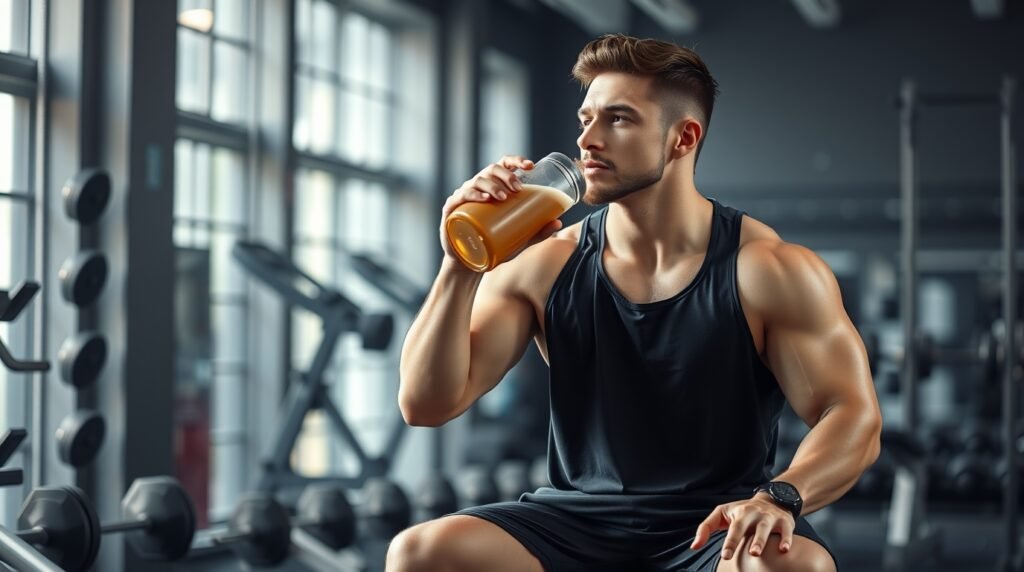
Whether you’re thinking about bulking up your muscles or simply eat for optimal health and fitness, protein is often the star of diet conversations. It’s a common belief that the more protein you eat, the more muscle you’ll build. But this results in a lot of misinformation about what the fact is for protein and muscle building. We need to discern the truth from fiction so that we can maximize our workout and dietary endeavors.
Myth 1: The More Protein, The More Muscle
One of the biggest is that just simply increasing protein intake leads to more muscle growth. Protein is necessary for muscle repair and growth, but the body can only use so much at any given time. Eating massive quantities of protein does not automatically lead to bigger muscles. Balance is key.
Myth 2: You MUST Consuming Protein After Exercising
Another popular belief is that you have to eat protein immediately after your workout to make gains. The “anabolic window,” long considered a vital time to consume protein, is not as limited as we once thought. And while having protein after working out can be useful for recovery, the most important thing is how much protein you consume over the course of your day. Instead, focus on spreading that intake out over the day.
Myth 3: ” Protiens sources are the same”
All protein sources are not created equal. The body utilises protein from various sources at different rates and amino acid profiles vary. Most animal proteins contain all of the essential amino acids, and they can be easier for our bodies to utilize than some of the common plant options. But if you mix and match plant proteins, then you can obtain all of the essential amino acids. Here are some examples:
- Animal sources: Chicken, beef, fish, eggs and dairy products
- Sources from plants: Lentils, beans, quinoa, tofu, nuts
Combine these protein sources for optimal support of muscle building and recovery.
Myth #4 – More Protein Is Necessary for Body Builders Only
There is a tendency for people to think that high protein diets are only intended for bodybuilders or athletes. Actually, anyone active and wanting to add lean mass can benefit from extra protein regardless of fitness level. Whether you are a daily gym rat or an old hand, protein is needed for muscle repair and recovery.
Myth 5: Plant-Based Diets Are Too Low in Protein
Another misunderstanding is that plant-based diets do not provide enough protein for building muscles. While it’s true that plant proteins are generally lower in one or more essential amino acids, vegetarians and vegans can absolutely get their protein needs met. With planning including a wide range of beans, lentils, nuts, seeds and grains you will be able to find enough sources.
Myth 6: You Need Protein Supplements for Building Muscle
Lots of people think they need protein supplements to build muscle. Indeed, whole foods can pack in all the protein you need without any powders or bars. While supplements can be convenient, they should never take the place of a balanced diet. http://easyfastwaystolooseweight.blogspot.com aspx Try to obtain your proteins in the form of food and only supplement where necessary.
Myth 7. High-Protein Diets Are Dangerous for Your Kidneys
Some say that high-protein diets can ruin the kidneys. This is of most concern for people who already have chronic kidney disease. It’s generally safe to consume higher doses of protein, and the additional amounts may help your muscles grow or maintain mass. As obviously if you’ve health problems about your diet plan A physician must be consulted all the time.
Myth 8: You Cannot Gain Muscle on a Low-Carb Diet
And yes, while carbs do help with muscle recovery and energy levels in exercise, it’s completely possible to build muscle on a low-carb diet. The body has the ability to adjust and learn how to use other energy sources — as long as you’re getting enough protein, muscle-building results are not out of the question. Plenty of athletes have been able to build muscle while following a keto or low-carb diet.
Knowing these universal misconceptions may assist you in making informed choices regarding your diet and exercise. Maximize-protein-quality-1NCD19html Redefine protein quality by amount, not popular belief Optimize your protein intake to build muscle and achieve better performance, but don’t overdo it.
Conclusion
So in order to gain muscle effectively the best protein-rich diet formation is now important for your journey towards fitness;lord. Picking nutrient-dense foods that contain loads of proteinand learning the function of macrosputs the power to make sound dietary decisions in your hands. Adding in clean sources of protein, veg and non-veg both allow your body to have the contribution of amino acids it needs for repairing muscles and also building new ones.
Ultimately, the timing of your protein matters too. Strategic protein intake, especially post workout can really take your muscle recovery and growth to another level. You and other folks should keep in mind the body’s protein needs can differ based on individual factors like activity level for instance or even general fitness goals.
The myths of protein and muscle growth need busting too. The real need for protein and the wealth of sources thereof are often confusingly conflated. You will be putting a realistic path on the goal which you want to achieve in building muscles and once these wrong notions are cleared away.
Whether its lean meats, diary, legumes or nuts the secret is to be consistent and balanced. Combine proteins from different sources for maximum lean muscle mass and overall health. Just make sure to time it around the right type of protein in a balanced diet and lifestyle, you’ll be fine. After all, the path toward muscle growth is specific to you and adjusting your protein levels as needed will set you up for success. Put your nutrition first, and see sustained results.